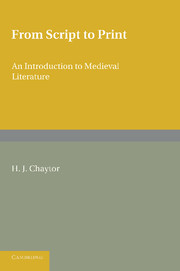Book contents
Chapter V - Prose and Translation
Published online by Cambridge University Press: 05 June 2016
Summary
UNTIL the end of the twelfth century literature produced for public entertainment or edification was almost entirely written in verse. The earliest specimens of French prose are legal documents, such as the Laws of William the Conqueror, or translations of the Bible. Prose made its way by slow degrees, as education advanced and as people learned to read for themselves; prose versions of earlier poems began to appear at the end of the twelfth century to meet the taste of readers who wanted a story devoid of the padding and prolixity which delayed the action in the verse narratives. The story-teller who told his tales in prose was also a figure in social amusement, whether he was a professional (conteor) or an amateur who volunteered to amuse a company at a loss for occupation, and may have helped to introduce a taste for prose romances and short stories. The prose version of Robert de Boron's Joseph of Arimathea, to which his Merlin was added, is the earliest considerable work of the kind known to us. Then came the prose versions of the Tristan story, which was known to Brunetto Latini, and of the Arthurian romances. Much of this increasing amount of prose writing was in the form of translation; Philippe de Dreux, for instance, translated among other works the Latin pseudo-Turpin in 1206 for Count Renaut of Boulogne, who commissioned a prose translation on the ground that verse could not be sufficiently literal. When Ville-hardouin produced his Conquête de Constantinople about 1213, prose writing may be said to have fairly started on its career.
Villehardouin was the first of a series of chroniclers who helped to satisfy curiosity concerning the crusades and the lands in which they were fought. There was also a desire for more information upon the history of the past. The historical information at the disposal of even the cultivated classes must have been singularly scanty and inaccurate, so long as they were dependent upon the works of Wace, Benoit de Sainte-Maure and others of the kind, while the information to be derived from the chansons de geste and the chansons d'aventure with their fantastic geography and wild anachronisms must have induced the inquirer to form a historical perspective no less surprising than the zoological information provided by the bestiaires.
- Type
- Chapter
- Information
- From Script to PrintAn Introduction to Medieval Literature, pp. 83 - 114Publisher: Cambridge University PressPrint publication year: 2013



